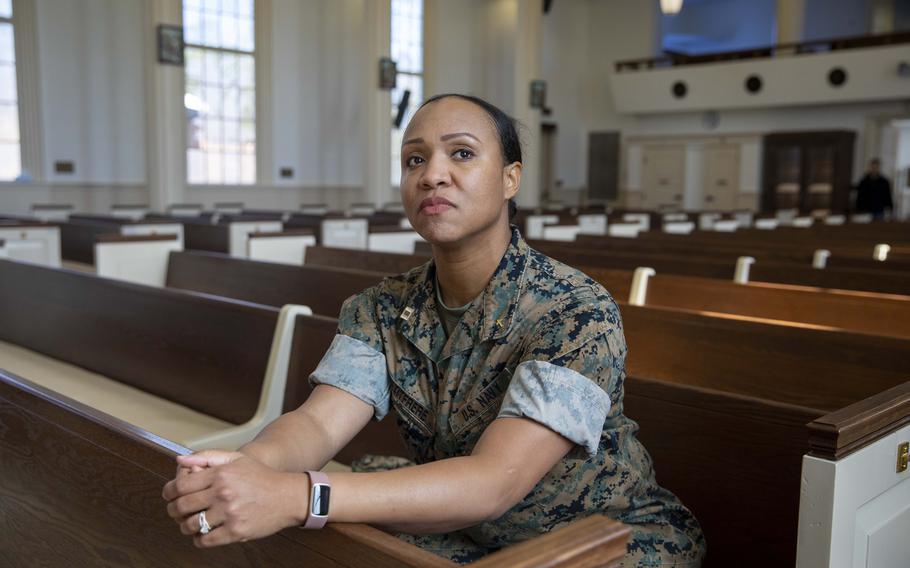
Navy chaplain Mercedes Petitfrere has accused Naval Medical Center Camp Lejeune of substandard medical care that she believes cost her son’s life and resulted in his stillbirth. (Amanda Andrade-Rhoades/for The Washington Post)
The pain surged throughout her lower body.
Navy chaplain Mercedes Petitfrere, 20 weeks pregnant with her first child, rushed to the emergency room at her military hospital in Jacksonville, N.C. Her abdomen throbbed. She could hardly walk. It hurt to pee. A midwife at Naval Medical Center Camp Lejeune attributed her pain to fibroids. But Petitfrere — a 35-year-old Black lieutenant whose pregnancy was considered high-risk because of her age — explained that she’d had the benign growths in her uterus for a long time, and that they had never caused any pain.
The hospital, she later said in a claim filed with the Navy, ignored her distress, told her fibroid pain was normal during pregnancy and expressed no concern about their discovery that she was having contractions. That day, Petitfrere was sent home and took prescription-strength Tylenol that was given to her by the midwife.
The Defense Department later argued that Lejeune’s hospital — which helps serve nearly 46,000 active-duty service members and their families on a military base with the country’s greatest concentration of Marines - “met the standard of care” and that it handled her case without “any negligent act or omission.”
Two days later, Petitfrere returned to the hospital. This time, she was spotting — she’d found blood in her underwear. She was still having contractions, and now, medical records show, her cervix was rapidly shortening, a sign of preterm labor. But the hospital treated her like a “nuisance,” she alleged in her claim, and said she and her baby were fine.
She wasn’t, though. By the next morning, on Dec. 20, 2018, Petitfrere was writhing in pain. She couldn’t stand or put on her uniform to go to work. She and her husband, Louis Petitfrere, at the time a fellow Navy chaplain, knew she needed medical attention right away. But she refused to go back to Lejeune. Instead, they raced to a nearby civilian hospital, where she couldn’t answer intake questions because she was screaming.
Three hours later, Petitfrere delivered a stillborn son. She and Louis had chosen a name for him when they’d first learned they were having a boy: Primas. He weighed less than a pound — 277 grams — and was 9 1/2 inches long.
The stillbirth was devastating, Petitfrere said in an interview, crying often as she recounted its impact on her and Louis.
They’d met at officer development school in 2016. He was a pastor from Southern California. She’d spent time in Africa as a missionary and worked as a chaplain resident at Sentara Norfolk General Hospital in Virginia.

Mercedes Petitfrere and her husband, Louis, met at Camp Lejeune and were married in 2018. (Amanda Andrade-Rhoades/for The Washington Post)
When Petitfrere first considered joining the Navy, she was worried the change of stations and possible deployments overseas might hinder her chances of having a family. She’d lost her mother to suicide before her 3rd birthday, and her father, who served in the Army, was often deployed, so his parents and sister helped raise her. She’d been praying for a husband and children her entire life and knew she would feel incomplete without them.
She was reassured by the Navy recruiter who had found her résumé online. “He said, ‘You’re going to be married and have a child before you leave your first duty station,’ ” Petitfrere recalled. “I looked at him with my mouth open. I knew the Lord was speaking through him.”
In 2018, when she and Louis were both assigned to Camp Lejeune, they got married and rented a four-bedroom with plenty of room for all the children they wanted to have together. Primas was going to have brothers and sisters.
Now, two dozen or so of their friends and relatives gathered at a Jacksonville funeral home for their baby’s memorial service. Petitfrere knew the red-brick building with white shutters well because she’d presided over services for veterans there. Inside, lullabies played on the speakers. A friend sang a gospel song. Another delivered a eulogy that Louis said gave them comfort in their anguish over the son whose name in Latin means “first” and whom he so badly wanted to call by the nickname, “Prime.”
Right after the service, Petitfrere told a friend that she wanted to sue the military hospital for medical malpractice.
But her friend, a Navy nurse, shocked her by telling her she couldn’t, Petitfrere recalled. A decades-old Supreme Court decision bars service members from suing the U.S. government for any injuries or harm they suffer that arise from their military service, regardless of whether it occurred in a combat zone or on a training mission or during medical treatment at a base hospital.
“Losing a child is painful regardless of the circumstances,” Petitfrere said, “but losing a child in the manner in which I lost mine — begging for help, being disregarded, sent away, made to feel as if it was all in my head, and being physically handled roughly by people who were supposed to help me — has eroded my general sense of safety. I went through a deep depression after losing my son. The grief of losing him was compounded by the horror I felt when I realized that I was surrounded by people who could help me, but they just refused to. That is not a feeling I will forget.”
She grieved Primas even as she gave birth to a daughter, became a chaplain at Marine Corps Base Quantico in Virginia, and got pregnant for a third time. In late 2020, when she was a few months away from delivering a second daughter, she heard about a new law designed to help service members like her: The Sgt. First Class Richard Stayskal Military Medical Accountability Act. Named after a Green Beret whose military hospital failed to recognize his lung cancer, the law allows troops to file claims within the Defense Department that allege medical malpractice by military health care providers.
“This was a divine thing,” Petitfrere said.
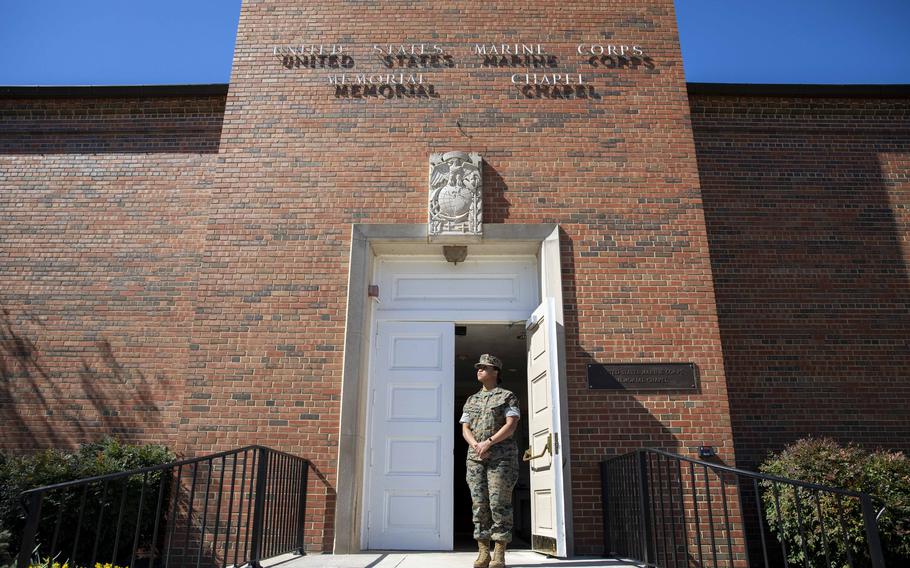
Petitfrere says she didn’t realize the long odds she faced in her medical malpractice claim against the military. (Amanda Andrade-Rhoades/for The Washington Post)
A new system ‘sabotaged’
In December 2020, Petitfrere filed a malpractice claim under the Stayskal Act, seeking $5 million in damages for the medical care she received at Lejeune.
It was not a lawsuit. The Supreme Court ruled unanimously in 1950 that the government could not be held liable “for injuries to servicemen where the injuries arise out of or are in the course of activity incident to service.” The decision, known as the “Feres doctrine,” was named after one of the men involved in the lawsuits examined by the court. After Army officer Rudolph Feres was killed in a barracks fire in northern New York, his widow had sued the U.S. government.
In its ruling against Feres’ widow and the others, the court pointed to the availability of veterans benefits to pay for injuries suffered on the job and said if Congress had wanted to give service members the right to sue, it would have laid out in the law whether financial judgments would replace or supplement those benefits. Four years later, the court reaffirmed its ruling, saying that allowing soldiers to sue for negligence would weaken the military’s ability to maintain discipline.
Over the years, the “Feres doctrine” has faced harsh criticism, including from a near-majority of Supreme Court justices in 1987. In a case involving a Coast Guard pilot whose helicopter crashed into the side of a mountain on the Hawaiian island of Molokai, the late Justice Antonin Scalia, joined by three other members of the court, wrote a dissenting opinion that declared Feres “clearly wrong” and cited its “unfairness and irrationality.” But five justices voted to uphold it, ruling that permitting such lawsuits would interfere with military discipline.
For service members and their relatives, the impact of Feres has been sweeping, shutting down lawsuits alleging sexual assaults, exposure to radiation, even being given LSD by military researchers without consent.
In 2019, federal lawmakers tried to carve out one exception to the doctrine: giving soldiers, sailors and airmen a chance to sue for improper medical care. Then-congresswoman Jackie Speier (D-Calif.) introduced the Stayskal Act, which would have allowed service members to file lawsuits alleging malpractice at nearly 700 military treatment facilities around the world, except for those in combat zones.
But the proposal ran into opposition from the Pentagon, which believed malpractice lawsuits would hamper medical decision-making and military readiness, and, from at least one prominent member of Congress, Sen. Lindsey O. Graham (R-S.C.), who thought the bill would expose the Defense Department to too many lawsuits.
So a compromise was reached: When the Stayskal Act was added to the 2020 National Defense Authorization Act, the final version only permitted service members to file administrative claims with the Defense Department — not lawsuits in federal court.
Still, Petitfrere hoped the new process would allow her to prove that Lejeune was responsible for Primas’ death.
“I thought that the Navy would want erring service members to be held accountable so that the larger body of their servicemen and women would have access to good medical care,” said Petitfrere, now 40, and the deputy command chaplain at Quantico.
Her claim alleged that Lejeune provided medical attention that was “grossly beneath the standard of care and cost Primas Petitfrere his life and forever altered the Petitfrere family.”
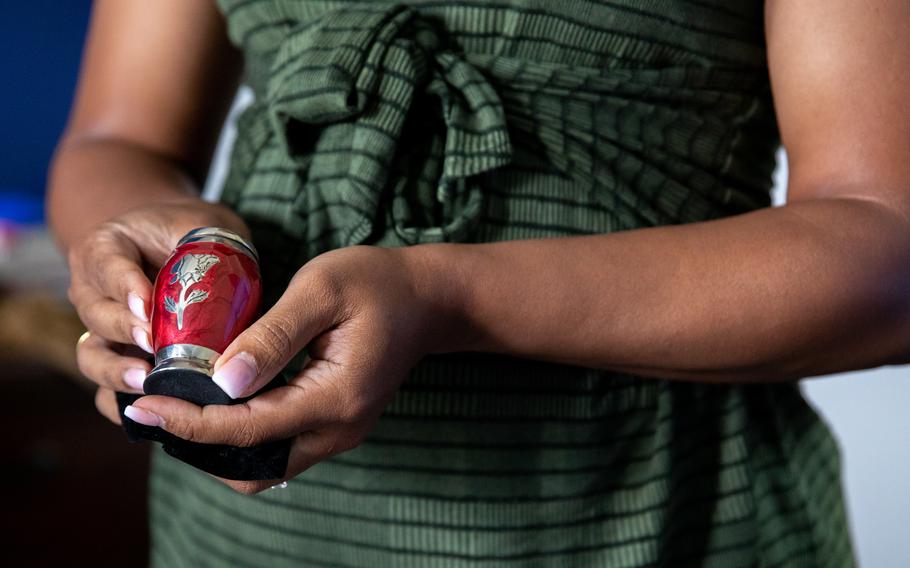
Petitfrere holds an urn containing the ashes of her stillborn son, Primas. (Amanda Andrade-Rhoades/for The Washington Post)
Lejeune’s staff minimized her discomfort, she contended in the claim, because she was “yet another Black woman experiencing fibroids.” At one point, a doctor Petitfrere said was Black asked her, according to her claim, “who told [her] it was a good idea to become pregnant if she had fibroids.” And when she asked for stronger pain medication, Lejeune’s staff said no, citing an opioid crisis in the military, even though she had no history of substance abuse. Eventually the hospital relented, and gave her acetaminophen intravenously, her claim said.
“If Mrs. Petitfrere were a pregnant White woman seeking critical medical attention at Naval Medical Center Camp Lejeune, one must wonder if somebody would have listened to her cries for help,” her claim stated. “If she were a pregnant White woman pleading for assistance, she would not have been accused of seeking to abuse drugs or been asked why she thought it was a good idea to get pregnant in the first place. If Mrs. Petitfrere had been a pregnant White woman who went to the Naval Medical Center Camp Lejeune’s emergency room, her son may still be alive today.”
The hospital referred questions from The Post about Petitfrere’s allegations to the Defense Health Agency, which oversees the military’s clinics, hospitals and medical centers. Peter Graves, the agency’s chief of media relations, said it was “inappropriate” to discuss individual medical malpractice claims.
Black women often face skepticism or indifference when they seek medical care for pain or other problems during their pregnancies, according to a new study by the United Nations on Black maternal mortality around the world. It found that African American women and teens in the United States were three times more likely to die while pregnant or in the six weeks after giving birth than white women in the country.
When she filed her claim, Petitfrere didn’t realize the long odds she faced to win a settlement. The vast majority of service members or their loved ones who file Stayskal Act claims get rejected. And that included Stayskal himself, whose claim was denied earlier this year. He is appealing.
Just 17 out of 502 medical malpractice claims filed with the military’s three major branches have yielded financial settlements as of mid-2023, according to the Army, Navy and Air Force. Another 134 have been denied. The rest are being reviewed, are under or eligible for appeal, or have been withdrawn. The claims have sought a total of $3.77 billion in damages, but only $3.95 million has been given out in the 17 settlements.
The Pentagon could not provide a breakdown of the claims by hospital, and neither could spokespeople for the three major military branches. But, according to Natalie Khawam and Alan Ripka, lawyers whose firm represents Stayskal and at least 150 service members, they include allegations of malpractice at some of the military’s largest and most prominent hospitals, including Walter Reed National Medical Military Center in Bethesda, Md.

Petitfrere prepares to deliver her sermon at the United States Marine Corps Memorial Chapel in Quantico. The image of a saint was left over from a Catholic service earlier in the morning. (Amanda Andrade-Rhoades/for The Washington Post)
“I was convinced that this was going to be a way of getting compensation to the service members and their families expeditiously, without the problems associated with lawsuits, which can go on forever,” said Speier, who retired from Congress in January. “What’s so painful is that the Stayskal Act was a huge win for our service members, but the administrative system that has been created has really sabotaged it.”
Rep. Darrell Issa (R-Calif.) and several others in Congress agree that the new system isn’t working. In June, they introduced the Healthcare Equality and Rights for Our Heroes Act, which would do the same thing the original version of the Stayskal Act was going to do — allow members of the armed forces to file lawsuits for injuries and deaths caused by improper medical care at military hospitals.
“Congressman Issa believes a good idea like this one — that meets a pressing need and has a clear legislative purpose — can gain widespread support and become law,” his spokesman, Jonathan Wilcox, said. “He’s not concerned about any of his colleagues or the Defense Department that might not yet agree.”
The military still opposes allowing service members to file malpractice lawsuits, a Defense Department spokeswoman said. Graham, a retired Air Force lawyer and the ranking Republican of the Senate Judiciary Committee, declined an interview request through a spokeswoman.
For Petitfrere, trying to navigate the current system was daunting because it was so opaque. She didn’t know which experts were examining her case, if they had conflicts of interest, or if they had the right qualifications. Nor did she know the identities of all of the military officials who would vote on her case. Unlike in a lawsuit, she wasn’t privy to the government’s evidence.
She hired a medical expert, James Wheeler, an OB/GYN in Houston who has a law degree and frequently testifies in medical malpractice cases. After examining her medical records, he wrote a detailed report submitted in October 2021 with a damning conclusion: “Due to the negligent healthcare provided Ms. Petitfrere at [Naval Medical Center Camp Lejeune] on 12/19/2018, she lost her first pregnancy to preterm labor and delivery.”
Wheeler found that Lejeune’s medical staff failed to recognize Petitfrere’s risk factors for and symptoms of preterm labor. If the hospital had kept her under observation for the “standard” four to six hours — as Petitfrere desired, according to her claim — instead of sending her home, she probably would have been diagnosed with preterm labor and given proper treatment.
He noted that images taken at Lejeune on the day before her stillbirth showed the length of her cervix had shortened — in the span of three minutes — from 4.46 centimeters to 3.31 centimeters. A cervical length of less than 2.5 centimeters is linked to a greater risk of preterm birth for pregnancies between 16 and 24 weeks, according to the American College of Obstetricians and Gynecologists.
“The images are a hammer over the head — not a tap on the shoulder — indicating preterm labor,” Wheeler told The Post in an interview.
Petitfrere’s preterm labor, he concluded in his report, was probably caused by increased contractions, which were possibly aggravated by fibroids. He attributed her successful pregnancies following the stillbirth to injectable progesterone, a hormone that calms the uterus.
He cited a doctor, a registered nurse, and a certified nurse midwife at Lejeune for their “departures from standards of care.”
Two months later, in December 2021, Kristina Schlieter, a tort claims attorney with the Navy’s Office of the Judge Advocate General in Norfolk, emailed Petitfrere’s lawyer, David Sheldon, saying that the military’s expert reviewed Wheeler’s report. The standard of care, she said, was met. A formal rejection letter of the malpractice claim, called an “initial determination,” was en route.
When Sheldon asked to see the written opinion of the expert that the government consulted — and to depose that expert — Schlieter denied his request.
“Our investigations are done in expectation of litigation and are work product and privileged,” Schlieter wrote him. “Consequently, you are not getting any opinions we have and are not deposing anyone.”

Petitfrere is still pursuing a case against the military, appealing a U.S. District Court decision dismissing her lawsuit. (Amanda Andrade-Rhoades/for The Washington Post)
Sheldon was stunned. The military, he said, appears to want two contradictory things: a law that bars service members from suing the military for medical malpractice — and the excuse not to share its expert reports out of fear of getting sued for medical malpractice.
When the Navy’s denial letter was issued, on Jan. 24, 2022, it offered no explanation.
“The damages alleged did not result from any negligent act or omission on the part of an employee of the United States,” Schlieter wrote. “Accordingly, your client’s claim is denied.”
Schlieter did not reply to a list of emailed questions from The Post. Instead, the questions were forwarded to Patricia Babb, a Navy spokeswoman, who said the Navy “does not comment on specific cases, due to privacy reasons.”
In her letter, Schlieter said Petitfrere was welcome to appeal, the final step in the claims process. In April 2022, the Defense Department’s Military Medical Malpractice Claims Appeals Board rejected her, too.
The letter, signed by the board’s chair, Gregory Girard, contained no explanation. Nor was there a list of the people who examined and voted on Petitfrere’s case.
Girard did not reply to an emailed list of questions. The appeals board, Graves said, is made up of Defense Department attorneys who are experienced in medical malpractice and who have not played a prior role in the claim that they evaluate. He added that the Pentagon in August 2022 amended its regulations and now requires “a meaningful” explanation “that includes the specific basis for the denial.”
That change came too late for Petitfrere.
In June 2022, she took the unusual step of filing a lawsuit in U.S. District Court for the District of Columbia, asking a federal judge to vacate the military’s initial denial of her claim and to send her case back to the Defense Health Agency for a new decision and potential appeals process.
Her lawsuit argued that the Defense Department’s rejection of her claim was “cursory and boilerplate.” In a separate motion, her lawyer called the system “an affront to what Congress intended when it changed the law so dramatically to allow for medical malpractice claims to be brought in such circumstances.”
Last month, U.S. District Judge Royce Lamberth dismissed her case. While he extended his sympathy to Petitfrere — for both “her anguish at the stillbirth and her frustration at medical personnel not taking her concerns seriously” — the judge said the law left him “powerless to second-guess” the Defense Department’s decision.
Now, she’s appealing Lamberth’s ruling. She isn’t done seeking accountability for Primas.

Giselle, Solomon, Mercedes, Farrah and Louis Petitfrere at their home in Spotsylvania, Va. (Norma Fayak/NormaFayakPhotography.com)
Pain and prayers
Petitfrere was screaming and crying for help when she and Louis arrived at Onslow Memorial Hospital at 8:13 a.m. on Dec. 20, 2018. Her cervix was six centimeters dilated and completely thinned. The fetal membranes encasing her baby were bulging. Soon, they ruptured, depriving him of protection from the uterus’ forceful contractions.
At 10:59 a.m., a doctor delivered Primas.
“I thought if they left the baby on my chest,” Petitfrere said, “he would come back to life.”
She’d known that her age alone put her at higher risk during any pregnancy. A fertility assessment she’d taken earlier that year indicated that she had fibroids, but the medical staff, she said, told her that their size and location should not thwart her chances of getting pregnant.
She also understood that fibroids might complicate her pregnancy. Over the years, she had come across articles showing that Black women suffer from fibroid pain more intensely than white women.
But Petitfrere had no trouble getting pregnant. On the day she’d tested positive, she slipped the pregnancy stick under Louis’ pillow before they went to sleep. When he found the pink-and-white object under his head, he stared in awe at the double lines.
“Everyone was elated,” Louis said.
The day after the stillbirth, a Lejeune staffer called Petitfrere, who “expressed concern about the care she received” at Lejeune, and “concern about her concerns being taken seriously,” according to her medical records.
But the staffer also wrote in her notes that Petitfrere had stated “that she is aware that her miscarriage could not have been prevented” — an assertion that Petitfrere vigorously disputes.
“They wrote that to protect themselves,” Petitfrere declared. “What I said was, ‘I understand that sometimes you can’t prevent a child from dying, but you can do all that you can do to prevent it from happening.’”
When they got home from Onslow, she and Louis cried and prayed. Their marriage, both said in interviews, grew stronger. She was granted a month of work leave.
A Bible verse, Jeremiah 29:11, brought them comfort when a trusted friend wrote it in a letter, dated on the day of Primas’ death: “For I know the plans I have for you,” declares the Lord, “plans to prosper you and not to harm you, plans to give you hope and a future.”
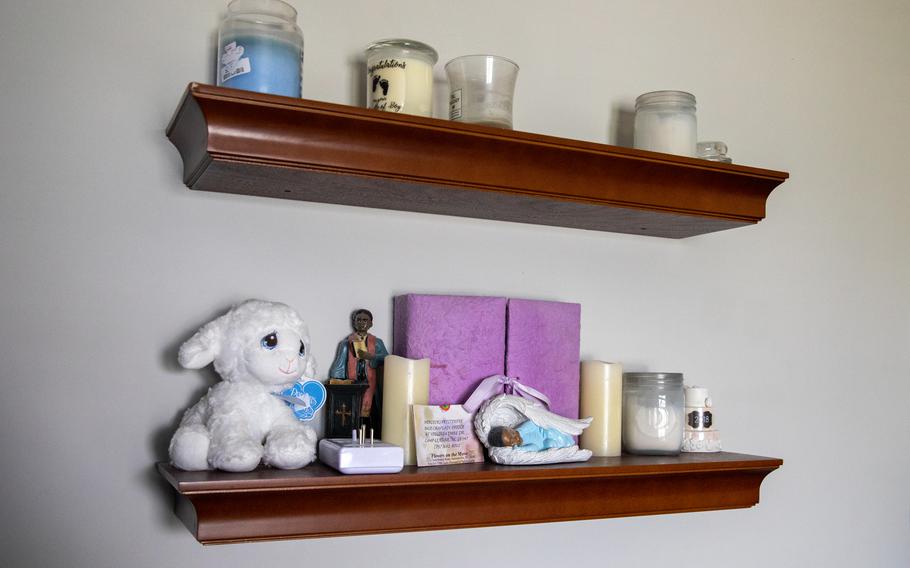
A memory box for Primas Petitfrere sits on a shelf in his parents’ bedroom at their home in Spotsylvania, Va. (Amanda Andrade-Rhoades/for The Washington Post)
“We were grieving our son, and trying unsuccessfully to conceive again, and grieving the fact that we did not know if I would ever be able to conceive again or carry a baby to term,” she said, “It was such a painful time. But that letter marked a turning point in our grief. We did not know if the Lord’s goodness would ever look like more children for us, but we did know the Lord was good and that we could trust Him, and so we did.”
‘Four children, not three’
Nowadays, Petitfrere shuttles between her job at Marine Corps Base Quantico and her home in Spotsylvania, Va. As deputy command chaplain, she presides over funerals, Sunday services, and retirement and promotion ceremonies.
When she and Louis relocated from North Carolina, they chose to live 50 miles away from the nearest military base, a distance that allowed her to seek medical care at closer civilian instead of military hospitals. Her three children born since Primas’s death were all delivered at Mary Washington Healthcare hospitals: Giselle, 3, Farrah, 2, and Solomon, nine months.
But every day, she and Louis grieve for Primas. Petitfrere is so traumatized by her treatment at Lejeune that she has considered leaving the military, fearing she’ll have to deploy and won’t have the flexibility to see civilian physicians for herself or her three children.
“I have loved the ministry with Marines and sailors. But there was no accountability. Nothing. Not even a proper, ‘I’m sorry.’ They won’t say that because that would admit guilt,” Petitfrere said. “It’s one thing to be in the military and you put your safety at risk from an enemy force in a war, but not from the people you work for who are supposed to protect you. I also could have died — and they would have let me. It’s very hard as a chaplain to represent an organization that I do not trust.
“I should have four children, not three.”
Petitfrere and Louis keep a purple box on a shelf next to her side of the bed. Inside is the positive pink and white pregnancy test. Black and white ultrasounds of Primas. His tiny footprints taken on a white card. A small red urn, engraved with a silver flower. And a card that reads, “Happy Birthday Primas.”
“I am grateful I was able to hold you and touch your little body,” Louis wrote on the card’s left side. “I loved kissing you through mommy’s belly and speaking to you.”
“You are our first son. Happy birthday my love,” Petitfrere wrote on the right side. “We will see you again. Mommy loves you dearly. Speak to the Lord on our behalf, we need it.”
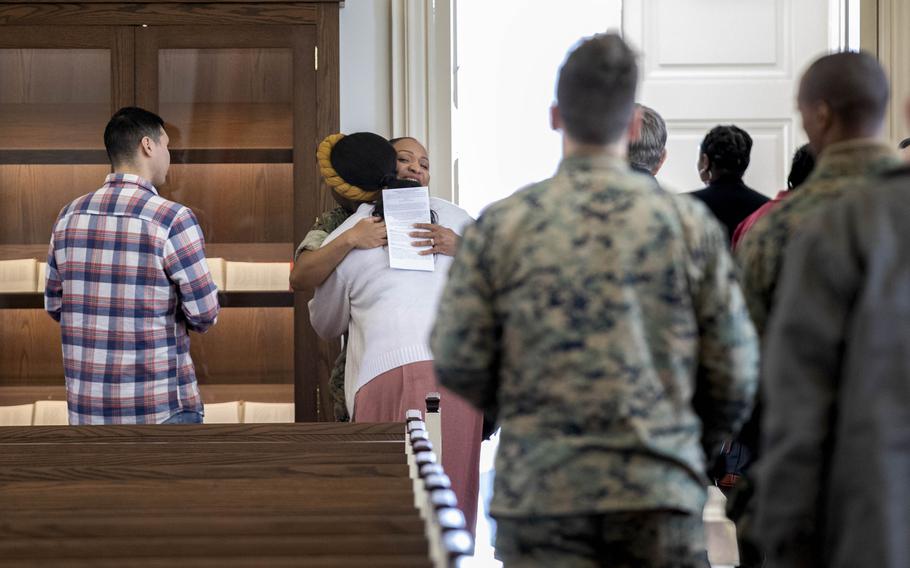
Petitfrere hugs parishioners after services at the United States Marine Corps Memorial Chapel in Quantico. (Amanda Andrade-Rhoades/for The Washington Post)